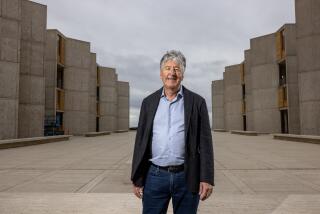Tree of Life Bodes New Buds for UCI Chief
- Share via
Retiring UCI Chancellor Laurel L. Wilkening alluded to a new career as a global environmentalist when she received the Tree of Life Award from the Orange County Chapter of the Jewish National Fund.
“My future career may be more related to the Tree of Life Award than my past [career],”
Wilkening, a planetary scientist, told 400 guests last week during a benefit for the fund at the Hyatt Regency Irvine.
In September, Wilkening, 52, announced plans to leave the UC system’s fastest-growing campus by June 30, 1998. She plans to pursue projects that bring her closer to her personal passions such as researching population growth, the global environment and women’s issues.
During a pre-dinner reception, Wilkening confided that being chosen for the award also received by Al Gore, Ted Turner and Elizabeth Dole was “totally unexpected.”
The experience is “very humbling,” she said. “Especially this award, because what the Jewish National Fund does means a lot to me. They are very much into [land] reclamation, reforestation . . . issues I am particularly concerned about as I am making my career change.”
The event, which featured as keynote speaker Jeane J. Kirkpatrick--former U.S. ambassador to the United Nations--was expected to net about $150,000.
During her remarks, Wilkening praised the Jewish National Fund for its desert reclamation efforts, which have resulted in the planting of more than 200 million trees in Israel.
“Through its innovative programs, the fund has . . . established forests, parks and villages where once there was only sand,” she said. The fund has “pioneered the appreciation and wise use of the elements on which we all depend for life--clean air, water and food. These are global commodities, even though we don’t usually think of them in those terms.”
Founded in 1901 at the 5th Zionist Congress in Basel, Switzerland, the fund was established to help purchase land on behalf of the Jewish people’s return to their ancient homeland.
“We are the national organization that raises funds to help reclaim the land of Israel by planting trees, building damns and roads,” said Adrian Gluck, the fund’s regional president. “Sixty percent of the land in Israel is still desert.”
Of Israel’s habitable areas, the corridor between Tel Aviv and Jerusalem is “one of the most densely populated areas in the world,” Gluck said. “We have no more room to grow.”
*
Presenting the award to Wilkening was her good friend, Albert Nichols, chairman emeritus of the Corning Nichols Institute in San Juan Capistrano. Nichols praised the “quiet, innovative style” Wilkening has employed during her tenure at the university.
She has taken UCI to international status with “little focus on sizzle or flash but on substance,” he said. She has asked “the tough questions and given the tough answers.”
Former UCI Chancellor Jack Peltason introduced Kirkpatrick as a “scholar, diplomat, syndicated columnist, political scientist, expert on world politics and international affairs, stateswoman.”
Kirkpatrick, dressed in a holly-red jacket, praised the fund that helps make “deserts bloom.”
“We, who have traveled in Israel, have seen the trees, forests,” she said. “Israel’s claim to the land has many faces, but none more important than the fact that Israel’s settlers themselves planted the trees, dug the wells, mixed their labor with the land using John Locke’s principal of legitimacy for the ownership of land.”
During her days as U.S. ambassador to the United Nations, Kirkpatrick was told--more than once, by friendly Arab ambassadors, she said--that she would never understand the unique political challenges of the region. “They said I would never understand because the United States, like Israel, is a settler nation.”
You are both people from “elsewhere,” they told her, “who do not have an integral relationship with the land.”
Their point underscored the “experience the United States and the state of Israel have in common,” she said.
“None more than the fact that these nations comprise people who come from other places, forging a nation . . . building schools, establishing communities and organizing democratic governments.”
More to Read
Sign up for Essential California
The most important California stories and recommendations in your inbox every morning.
You may occasionally receive promotional content from the Los Angeles Times.










